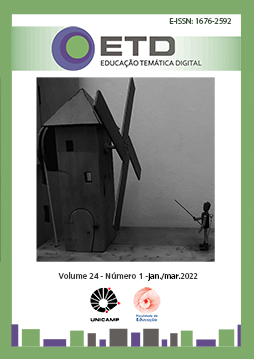Abstract
This is a study about the experience of using digital technologies, especially social media on the internet, in the educational practices of the Open Room Extension Project, linked to the Institute of Information Science, of the Federal University of Bahia, during the pandemic period, caused by the new Sars-Cov-2 coronavirus. The Project aims to enhance the approximation between the Institute and the external community, in order to foster integration, debate and critical awareness of social, cultural and educational issues, in order to enable continuing education. As a methodology, he used communication devices for mediation of information, such as Youtube and Facebook for transmission of lives, through StreamYard; Instagram, Facebook and emails for marketing and digital content of the proposed activities, which included lectures, workshops, interviews with authors, and thematic series. As a result, this extension action reached over 12 thousand views in live broadcasts and issued 1,667 certificates, in addition to public engagement and the creation of an information network on subjects of interest in the fields of knowledge under debate. The experience highlights the importance of innovative actions in education, especially when there is physical and social distance, using technologies and the internet, consciously, to promote the exchange of experiences and allow greater visibility of the teaching, research and extension contents, in addition to of good practice initiatives developed in the pandemic context.
References
ALCOFORADO, Joaquim Luís Medeiros. O papel da Universidade é ensinar a pensar bem. Trabalho & Educação, Belo Horizonte, v. 29, n. 1, p. 171-180, abr. 2020. Disponível em: https://periodicos.ufmg.br/index.php/trabedu/article/view/20620. Acesso em: 19 fev. 2021.
CASTELLS, Manuel. A sociedade em rede. São Paulo: Paz e Terra, 1999..
CASTELLS, Manuel. A galáxia da internet: reflexões sobre a internet, os negócios e a sociedade. Rio de Janeiro: Jorge Zahar Ed., 2003.
CASTELLS, Manuel. O poder da comunicação. Lisboa: Fundação Calouste Gulbenkian, 2013.
FLORIDI, Luciano. The ethics of information. New York: Oxford University Press, 2013.
LAGUARDIA, J.; PORTELA, M.; VASCONCELLOS, M. Avaliação em ambientes virtuais de aprendizagem. Educação e Pesquisa, 2007, v. 33, n. 3, p. 513-530, set./dez. 2007.
LÉVY, Pierre. As Tecnologias da Inteligência. São Paulo : Editora 34, 1993.
MIRANDA, Gerlane Lima de; ALBUQUERER, Morgana Ramos; GOMES, Valeska de Sousa. Estimulando a educação continuada de colaboradores em uma biblioteca universitária: o caso do projeto biblioteca escola. Revista Informação & Universidade, São Paulo, v. 2, n. 2, p. 1-13, jul. 2020. Disponível em: http://reviu.febab.org.br/index.php/reviu/article/view/25/23. Acesso em: 19 fev. 2021.
VYGOTSKY, L. S. A formação social da mente. 6. ed. São Paulo: Martins Fontes, 1998.
VYGOTSKY, L. S.. Pensamento e linguagem. S.l. Edição eletrônica: Ed Ridendo Castigat Mores, 2001. Disponível em: http://www.ebooksbrasil.org/adobeebook/vigo.pdf. Acesso em: 10 fev. 2021.

This work is licensed under a Creative Commons Attribution-NonCommercial-NoDerivatives 4.0 International License.
Copyright (c) 2022 ETD - Educação Temática Digital


